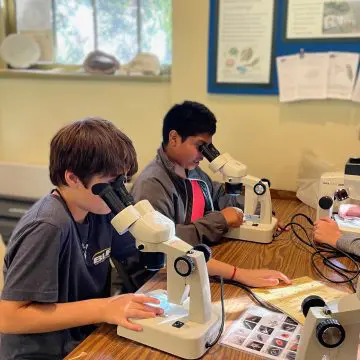Science
Inquiry and Discovery
Explorer West's science curriculum provides students with a strong foundation in the scientific content necessary to understand how their world works and to make educated decisions that are affected by this knowledge.
Curriculum goals include:
-
Students can recall essential information to piece together a system from its components and put them back together logically step-by-step to understand the whole.
-
Students recognize that scientific understanding is dynamic and open to revision and even complete disposal when discoveries are made.
-
Students can understand and apply the Scientific Method as a critical step toward becoming scientifically-literate citizens. Students create experiments, follow them to logical conclusions, and then present their findings in written and oral formats.
-
Students can recall essential information to piece together a system from its components and put them back together logically step-by-step to understand the whole.


-
Students use scientific information to draw connections between scientific concepts and their practical applications.
-
Students recognize moral and ethical boundaries surrounding scientific testing and the application of new understandings.
-
Students develop the necessary skills to succeed in an academic setting: organization, written and oral communication, problem-solving, reflection, consistent study habits, and respect for the learning environment.
-
Students are prepared for high school science, the majority at an advanced level.
-
Students understand the relationship of science to sustainability. The three major components of sustainability - society, environment, and economy - lend themselves to direct investigation and application in science
Explorer West Science: Major Elements by Grade

Sixth Grade
The fundamentals of physical and chemical science
Designing and conducting experiments
Forming reasonable conclusions based on data
Building models
Designing, building, and testing snowshoes
Seventh Grade
Life on Earth, diversity of life, and evolution
Biology
Genetics
Human body and reproduction
Cell models
Virtual dissections
Gen analysis through close reading, class discussions, and book reviews

Eighth Grade
Structure of Earth
Volcanoes and earthquakes
Beginnings of our galaxy and solar system
Classroom weather station
Connect scientific understanding to making sustainable choices
Build a desalination plant
